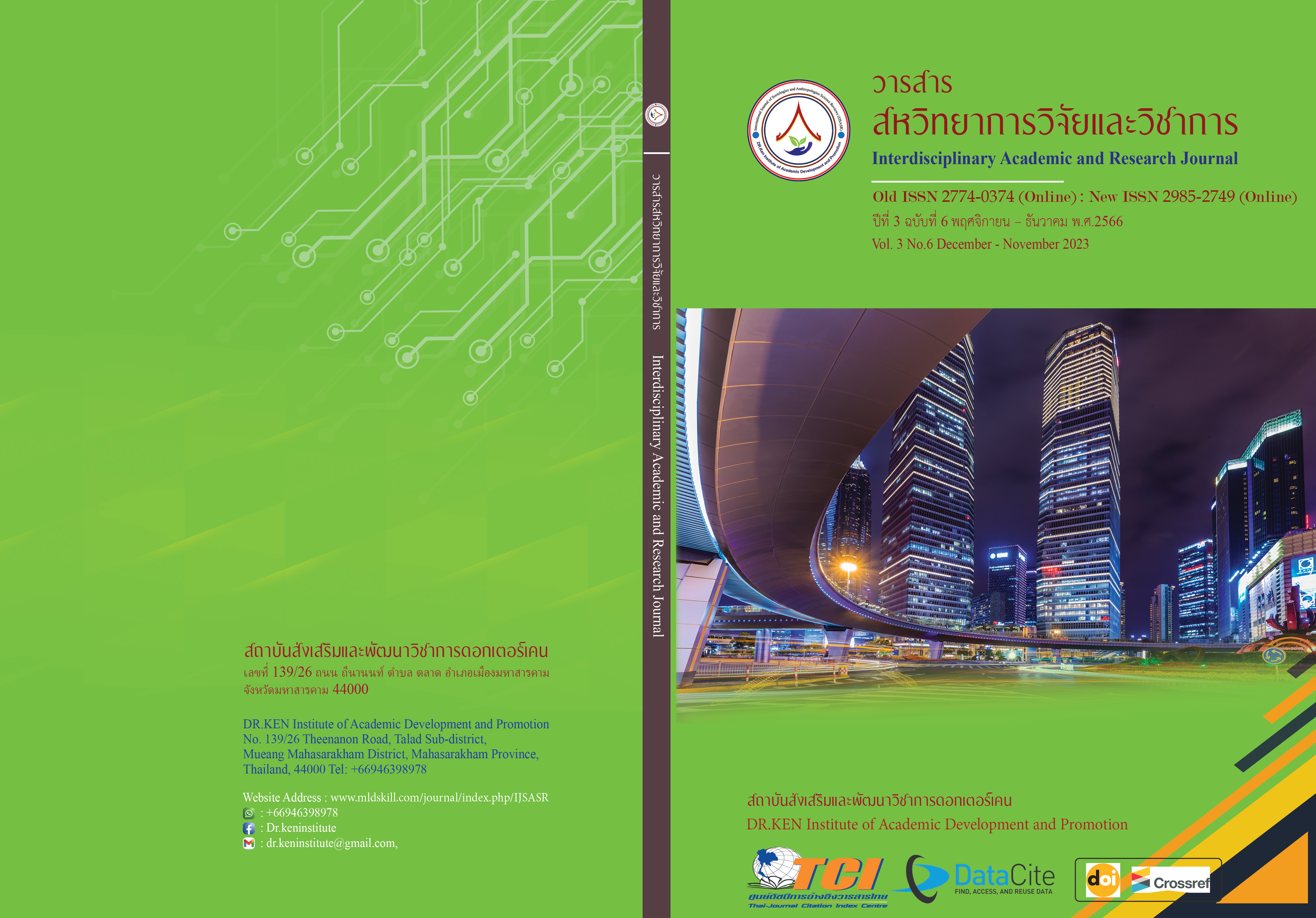Good Governance for The Exercising Power of The Department of Special Investigation under The Special Investigation Act B.E. 2547
DOI:
https://doi.org/10.60027/iarj.2023.270419Keywords:
Good Governance; , Exercising Power; , Department of Special InvestigationAbstract
Background and Aim: The Department of Special Investigation is an agency in the justice process under the Ministry of Justice. Responsible for investigating special cases by dealing with criminal cases. Including the duty to prevent and suppress criminal cases that affect the people, the economy, and national security. In the performance of duties according to the law, the Special Case Investigation Act of 2004 empowers the Department of Special Investigation through four groups of persons: the Special Case Investigation Committee (PCC), Special Case Investigation Officers (SCI), and the Committee of Special Case Investigation Officers (NSF) to perform different duties. The research objectives are to study and analyze the situation of problems and effects of the use of power by the Department of Special Investigation under the Special Investigation Act B.E. 2547, to study and research principles, concepts, and theories on international governance. Abroad and in Thailand to study and analyze the power and use of the power of the Department of Special Investigation under the Special Investigation Act, B.E. 2547, to study and analyze the principles of good governance for the use of power by the Department of Special Investigation under the Investigation Act. Special Case 2004 and to establish good governance principles for the use of power by the Department of Special Investigation under the Special Case Investigation Act 2004.
Methodology: The Research sources; This research uses research science to collect and analyse data as qualitative research consisting of documentary research. In-depth interview Participation in design Participation in design.
Results: the results of the research are good governance principles that are suitable for the exercise of the power of the Department of Special Investigation according to the Special Investigation Act B.E. 2547. There are seven principles of good governance as follows: rule of law, morality, transparency, the principle of value, the principle of participation, the principles of responsibility, and the principles of fairness and equality. The exercising power of The Department of Special Investigation on behalf of the state power for the justice procedure affects directly not only the rights of the people, and government officials, but also government sectors which have been affected by such exercising. However, from past to present, there is the phenomenon which is the fact that has been disclosed to the public by the mass media that there are many cases that make the people suspect how is legal, fairly, and rule of law the exercising power of the Department of Special Investigation. The disclosure of information by giving answers to the people is based on legal authority, accuracy, and transparency. On the other hand, people shall expect that the operation by exercising the power of the Department of Special Investigation under the Special Investigation Act B.E.2547 must be complied with, and conform to the principle of good governance related to such operation that can be specified in 7 principles: Rule of Law, Morality, Transparency, Participation, Cost-Effective or Economy, Accountability, and Equity. Therefore, the determination of principles of Good Governance of the exercising of the Department of Special Investigation will encourage the Good Governance principles for regulating the provisions of law relating to the Department of Special Investigation which have had no such provisions in the Thai law. The lack of provisions of such a law means the lack of fundamental rights and security for the people which will be affected directly by the exercising power of the special investigation office, or the ground status of people, sovereignty power’s owner. Such principles will make a confidential to the people that the government official will exercise his power in compliance with the principles of Good Governance.
Conclusion: The determination of Good Governance principles for the exercising power of the Department of Special Investigation B.E. 2547 from this research will lead to generating the model law for the principles of good governance by the Ministry of Justice which has an authority to control the Department of Special Investigation by bring these principles to modify and present to the legislative branch for to be legislative as a law status for the exercising power of the Department of Special Investigation, which be the benefits for the justice procedure, standardize the exercising power of the Department of Special Investigation in the justice procedure to enhance to be the world class organization of the inquiry, investigation, protection, and suppression of the special case, that will make the peaceful social, and for the state security.
References
เกรียงไกร เจริญธนาวัฒน์. (2556). หลักพื้นฐานกฎหมายมหาชน. กรุงเทพฯ: วิญญูชน.
ไชยวัฒน์ ค้ำชูและคณะ. ผู้แปล. (2545). ธรรมาภิบาล : การบริหารการปกครองที่โปร่งใสด้วยจริยธรรม. กรุงเทพฯ: น้ำฝน.
ไทยพับลิก้า กล้าพูดความจริง. (2560). ศาลวินิจฉัยการตายคดี “ธวัชชัย อนุกูล” อดีตเจ้าหน้าที่ที่ดินจังหวัดพังงา ระบุ “มีผู้อื่นทำให้เสียชีวิตในขณะถูกควบคุม. Retrieved October 11, 2022, from: https://www.thaipublica.org.
บรรเจิด สิงคะเนติ. (2542). หลักพื้นฐานสิทธิเสรีภาพและศักดิ์ศรีความเป็นมนุษย์. กรุงเทพฯ: สำนักพิมพ์สถาบันบัณฑิตพัฒนบริหารศาสตร์.
บวรศักดิ์ อุวรรณโณ. (2542). การสร้างธรรมาภิบาล (good governance) ในสังคมไทย. กรุงเทพฯ: วิทยาลัยป้องกันราชอาณาจักร
พนารัตน์ มาศฉมาดล. (2564) ธรรมาภิบาลในการบริหารงานภาครัฐตามรัฐธรรมนูญแห่งราชอาณาจักรไทย พุทธศักราช 2560, กรุงเทพ: สถาบันพระปกเกล้า
พัชรี สิโรรส และคณะ. (2561) ธรรมาภิบาล: จากแนวคิดสู่การปฏิบัติในสังคมไทย . กรุงเทพฯ: สถาบันพระปกเกล้า.
วิภาส ทองสุทธิ์. (2551). การบริหารจัดการที่ดี. กรุงเทพฯ: อินทภาษ.
สถาบันวิจัยเพื่อการพัฒนาประเทศไทย. (2561). “ธรรมาภิบาล”. Retrieved October 11, 2022, from http:// www.tdri.or.th.
สมศักดิ์ สามัคคีธรรม. (2561). ธรรมาภิบาลและความรับผิดชอบทางสังคม . กรุงเทพฯ : สำนักพิมพ์สถาบันบัณฑิตพัฒนบริหารศาสตร์.
Downloads
Published
How to Cite
Issue
Section
License
Copyright (c) 2023 Attanai Sairat, Achara Lertpornparsopchoke, Montree Numnam, Thammasak Senamitr

This work is licensed under a Creative Commons Attribution-NonCommercial-NoDerivatives 4.0 International License.
Copyright on any article in the Interdisciplinary Academic and Research Journal is retained by the author(s) under the under the Creative Commons Attribution-NonCommercial-NoDerivatives 4.0 International License. Permission to use text, content, images, etc. of publication. Any user to read, download, copy, distribute, print, search, or link to the full texts of articles, crawl them for indexing, pass them as data to software, or use them for any other lawful purpose. But do not use it for commercial use or with the intent to benefit any business.
















.png)


